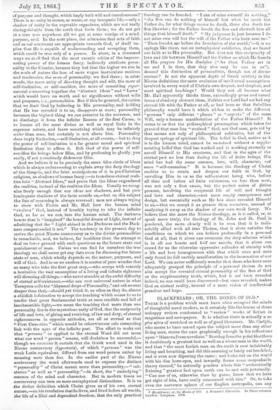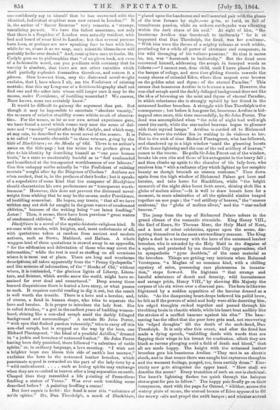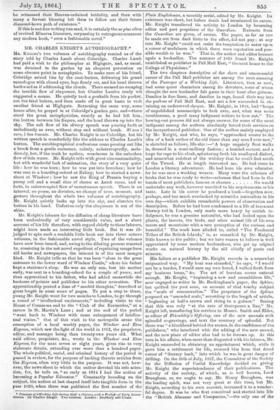BLACKFRIARS ; OR, THE MONKS OF OLD.*
THERE is a problem which must have often occupied the minds of thoughtful novel readers, as it certainly fills the brains of those unhappy writers condemned to " review " works of fiction in magazines and newspapers. It is whether there is actually a tie plus ultra of wretched as well as of good literature. Mr. Carlyle, who seems to have mused upon the subject more than any other living man, states the case graphically enough in his reflections upon "MinervaPress novelists." Starting from the point thatthere is doubtlessly a greatest fool as well as a wisest man in the world, and that "the most foolish man on the earth is now indubitably living and breathing, and did this morning or lately eat breakfast, and is even now digesting the same ; and looks out on the world with his dim horn-eyes, and inwardly forms some unspeakable theory thereof," he naturally ponders where this "authentically Existing" greatest fool upon earth can bo met with personally. " Can one of us, otherwise than by guess, know that we have got sight of him, have orally communed With him ? Or, to take even the narrower sphere of our English metropolis, can any • Hlackfriars ; or, the Monks of Ohl. A Romanre Chronicle. In Three volumes London: Longman. 1864.
one confidently say to himself that he has conversed with the identical, individual stupidest man now extant in Loudon ?" It is, the author• of Sartor Resartus" truly remarks, a "strange, tantalizing pursuit. We have the fullest assurance, not only that there is a Stupidest of London men actually resident, with bed and board of some kind in London ; but that several persons have been, or perhaps are now speaking face to face with him, while for us, chase it as we may, such scientific blessedness will probably be for over deuied." And, coming from men to books, Mr. Carlyle goes on to philosophize that "of no given book, not even of a fashionable novel, can you predicate with certainty that its vacuity is absolute, that there are not other vacuities which shall partially replenish themselves therefrom, and esteem it a plenum. How knowest thou, may the distressed novel-wright exclaim, that I, hero where I sit, am the Foolisliest of existing mortals; that this my Ling-ear of a fictitious biography shall not find one and the other into whose still longer ears it may be the means, under Providence, of instilling somewhat ? We answer, None knows, none can certainly know."
It would be difficult to gainsay the argument thus put. But though it may be impossible to ascertain '‘ absolute vacuity," the measure of relative stupidity seems within reach of observa- tion. For the nonce, as far as our own actual experience goes, we have found a novel which comes very near the acme of dul- nesa and " vacuity " sought after by Mr. Carlyle, and which may, at any rate, be described as the worst novel of the season. It is a so called "romantic chronicle" in three volumes, going by the title of Blackfriars; or, the Monks of Old. There is no author's name on the title-page; but the writer in the preface gives a clue to his identity by describing himself as "one poor human brain," in a state so unutterably bashful as to " feel confounded and humiliated at the transparent worthlessness of our labours." Can this unhappy scribe actually be "the Foolishest of existing mortals" sought after by the Diogenes of Chelsea ? Authors are often modest, that is, in the prefaces of their books ; but it speaks of a superlative of some kind that the composer of Blackfriars should characterize his own performance as " transparent worth- lessness." However, this does not prevent the distressed novel- wright from wishing that he may be the means, under Providence, of instilling somewhat. He hopes, nay trusts, " that all we have written may not sink for naught in the great waters of condemned oblivion," because of the writing being "our latest fondling." Latest Then, it seems, there have been previous " great waters of condemned oblivion." We shudder•.
Blackfriars is a novel of the mystic-historic-religious kind. It swarms with monks, with knights, and, most unfortunate of all, with quotations taken at random from ancient and modern authors, such as Stowe, Maitland, and Hallam. A whole waggon-load of these quotations is stowed away in an appendix, " for the edification and delectation of those who may covet the information," while the rest is used as stuffing on all occasions where it is most out of place. There are long and wearisome descriptions, all taken apparently from the "Penny Cycloptedia " and like sources of information, of the " Monks of Old," without whom, it is contended, " the glorious lights of Liberty, Litera- ture, and Science, which awoke anew the world, might have re- mained for ever dead and unnurtured." Deep among these learned disquisitions there is buried a love story, or what passes as such. It requires careful reading to dig it out, but the result is well worth the trouble. There is a hero and a heroine, and, of course, a fiend in human shape, who tries to separate the hero and heroine. It is proper to introduce the lady first. She is called Aveline, " a girl in the earliest years of budding woman- hood, shining like a sun-clad seraph amid the darkly foliaged background and surroundings." A certain Sir John Perrot, " with eyes that flashed passion volcanicly," tries to carry off this sun-clad seraph, but is stopped on the way by the hero, one Richard Plantagenet, " the Ideal of a youthful Achilles," dressed in " a jerkin and breeches of untanned leather." Sir John Perrot having been duly punished, there followed "a calenture of noble spirits," or, in ordinary language, a love meeting. "I wish not a brighter hope can bloom this side of earth's last morrow," exclaims the hero in the untanned leather breeches, which passionate appeal is rewarded on the part of the lady-love by a "wild enthralment such as loving spirits may exchange when they are re-united in heaven after a long separation on earth.
Clasped thus they resembled a life painting of Prometheus fondling a statue of Venus." Was ever such touching scene described before ? A painting fondling a statue!
But Inlet anguis in herbd : the fiend is near this " calenture of no'ole spirits." He, Dan Theodulph, a monk of Blackfriars,
" glared upon the handsome and well-assorted pair with the gleam of the iron furnace by night,—so grim, so lurid, so full of tumultuous passion, while an unborn earthquake was vibrating within the dark chaos of his soul." At sight of him, "the beauteous Aveliue was fearstruck to taciturnity " for it so happened that Dan Theodulph, the fiend, was her confessor- " With him were the throes of a mighty volcano at work within, precluding for a while all power of utterance and composure, in the wild thronging of his vulture passions." So that it seems he, too, was "fearstruck to taciturnity." But the fiend soon recovered himself, addressing the seraph in honeyed words as follows :—" I cannot rest, dear• child, until I have placed thee in the barque of refuge, and seen thee gliding therein towards the sunny shores of celestial Eden, where thou mayest ever browse on the golden mint and thyme of the eternal Paradise." This means that beauteous Aveline is to become a nun. However, the sun-clad seraph amid the darkly-foliaged background does not like the idea of browsing on the mint and thyme of eternal Paradise, in which reluctance she is strongly upheld by her friend in the untanned leather breeches. A struggle with Dan Theodulph is the consequence ; but before it has gone far, beauteous Avelino is kid- napped once more, this time successfully, by Sir John Perrot. The deed was accomplished when "the robe of night had well-nigh cased the earth, while the star-nailed heavens began to glimmer with their myriad lamps." Avelino is carded off- to Richmond Palace, where the robber lies in waiting to do violence to her. But in the nick of time Richard Plantagenet, who has followed, and clambered up to a high window "amid the gleaming bursts of the fierce lightning and the roar• of the red artillery of heaven," comes to the rescue. He pulls Sir John Perrot out of the window, breaks his own ribs and those of his antagonist in the heavy fall ; and then climbs up again to the chamber of his lady-love, who receives him " with a radiance ofjoy which lighted up her seraphic beauty as though beneath an unseen sunbeam." Then down again from the high window of Richmond Palace get hero and heroine, and take horse for Blackfriars, while " the bright monarch of the night skies burst forth anew, shining aloft like a globe of molten silver."—It is well to draw breath here for a moment, in mute admiration of all the splendid similes heaped together on one page ; the " red artillery of heaven," the " unseen sunbeam," the "globe of molten silver," and the " star-nailed heaven."
The jump from the top of Richmond Palace ushers in the grand climax of the romantic chronicle. King Henry the Earl of Essex, Sir Thomas More, the Holy Maid of Kent, and a host of other celebrities, appear upon the scene, dis- porting themselves in the most extraordinary manner. The King fights a duel in a tourney with the hero of the untanned leather breeches, who is attended by the Holy Maid in the disguise of a squire, and protected by ten thousand City apprentices, clad in sympathetic " pyne doublets," of the same material as the breeches. Things are getting very intricate when Raimond Verstegans, "a Magian of no common kind, with a chilling mystery of mien, possessing rare phenomena in incanta- tion," steps forward. He frightens " that strange and hateful admixture of deceit and ferocity, wild incontinence and savage pride, Henry VIII.," by showing His Majesty the corpses of his six wives over a charcoal pan. The hero is likewise frightened by a sudden apparition of the heroine dressed as a bride. "As the dampening heart-drops bedewed his pallid brow, he felt as if the powers of mind and body were alike deserting him, his edged thoughts rushed together and passed through his throbbing brain in chaotic whirls, while his heart beat audibly like the strokes of a muffled hammer• against his ribs." The ham- mering has the effect that the poor hero gets mad, not recovering his "edged thoughts" till the death of the arch-fiend, Dan Theodulph. It is only after this event, and after the fiend has made a dying speech, "unfolding deeds with words that are flapping their wings in his breast for confession, albeit they are black as ravens plunging amid a field of death and blood," that all are made happy. The knight with the untanned leather breeches gets his beauteous Aveline. "They met in an electric shock, and in that trance there was naught but rapturous thoughts and the warmest feelings, purged, too, from earthly dross." Elec- tricity now gets altogether the upper hand. " How shall we describe the scene? Every transition of such an one is electrical.
The heart's lightning flashes too quick through the halcyon storm-gust for pen to follow." The happy pair finally go on their honeymoon, start with the papa for Ostend, " whither, across the watery plain of ocean, the eternal breeze of Eden appeared to fill the snowy tails and propel the swift barque ; and whither arrived he witnessed their Heaven-ordained bridality, and then with many a fervent blessing left them to follow out their future diamond-hewn path of existence."
If this is not fine writing run mad, it is certainly the neplus ultra of revived Minerva literature, surpassing in outrageous nonsense any modern book, " even a fashionable novel." •
































 Previous page
Previous page